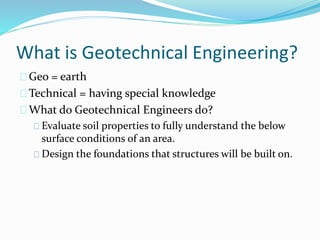The Basic Principles Of Geotheta
The Basic Principles Of Geotheta
Blog Article
The Main Principles Of Geotheta
Table of ContentsNot known Factual Statements About Geotheta Our Geotheta IdeasGetting The Geotheta To WorkGetting My Geotheta To Work7 Simple Techniques For Geotheta

They carry out website examinations, collect samples, do laboratory examinations, and examine information to assess the viability of the ground for construction jobs - Tailings Engineer. Based upon their searchings for, geotechnical engineers supply referrals for foundation style, incline security, preserving structures, and reduction of geotechnical dangers. They team up with various other professionals, such as architects, architectural engineers, and building groups, to make certain that geotechnical factors to consider are incorporated right into the total project style and execution
By analyzing the habits and homes of dirt and rock, they can recognize possible geotechnical risks such as landslides, soil negotiation, or incline instability. Their experience helps prevent failings or crashes that might threaten lives and property. Right here are some comprehensive responsibilities and duties of a geotechnical designer: Website Investigation: Geotechnical engineers conduct website investigations to gather information on subsurface problems.
They translate the information to understand the buildings and actions of the dirt and rock, including their stamina, permeability, compaction qualities, and groundwater problems. Geotechnical Evaluation and Design: Geotechnical designers assess the information accumulated during site investigations to analyze the security and viability of the site for building jobs. They perform geotechnical calculations and modeling to evaluate elements such as birthing ability, negotiation, incline security, lateral planet stress, and groundwater circulation.
Getting My Geotheta To Work
Foundation Style: Geotechnical engineers play an essential function in making structures that can securely support the desired structure. They assess the dirt conditions and lots demands to figure out the ideal foundation kind, such as superficial structures (e.g., grounds), deep foundations (e.g (https://soundcloud.com/geotheta)., stacks), or specialized techniques like dirt enhancement. They take into consideration factors such as negotiation restrictions, bearing capacity, and soil-structure communication to create ideal structure styles
They examine building strategies, screen site tasks, and carry out area assessments to validate that the design referrals are complied with. If unpredicted geotechnical concerns occur, they evaluate the scenario and give referrals for removal or modifications to the style. Danger Assessment and Reduction: Geotechnical engineers analyze geotechnical hazards and dangers associated with the job site, such as landslides, liquefaction, or dirt erosion.

Partnership and Communication: Geotechnical designers work closely with various other specialists entailed in a task, such as designers, structural designers, and building teams. Reliable interaction and collaboration are necessary to integrate geotechnical factors to consider into the general job style and building procedure. Geotechnical designers give technological expertise, response queries, and guarantee that geotechnical needs are met.
Not known Facts About Geotheta
Below are some kinds of geotechnical designers: Structure Engineer: Structure designers focus on designing and analyzing structures for frameworks. They examine the soil conditions, load requirements, and website attributes to figure out one of the most ideal foundation type and style, such as shallow foundations, deep structures, or specialized methods like stack structures.
They examine the factors affecting slope stability, such as dirt residential or commercial properties, groundwater problems, and incline geometry, and create methods to avoid slope failures and minimize threats. Earthquake Engineer: Earthquake designers specialize in assessing and making structures to stand up to seismic pressures. They examine the seismic danger of a site, assess dirt liquefaction possibility, and develop seismic design criteria to make sure the security and durability of frameworks throughout earthquakes.
They perform field screening, gather samples, and examine the collected information to identify the dirt homes, geologic formations, and groundwater conditions at a site. Geotechnical Instrumentation Engineer: Geotechnical instrumentation designers concentrate on monitoring and measuring the behavior of soil, rock, check and structures. They mount and maintain instrumentation systems that check aspects such as soil settlement, groundwater degrees, slope movements, and structural displacements to analyze efficiency and offer very early cautions of prospective problems.
Geotheta Fundamentals Explained
They conduct examinations such as triaxial examinations, consolidation examinations, direct shear examinations, and permeability tests to gather information for geotechnical evaluation and design. Geosynthetics Designer: Geosynthetics engineers focus on the design and application of geosynthetic materials, such as geotextiles, geogrids, and geomembranes. They make use of these materials to boost soil stability, enhance slopes, supply drain options, and control erosion.
They tend to be investigatory individuals, which suggests they're intellectual, introspective, and curious. They are interested, systematic, reasonable, logical, and sensible. Some of them are also social, indicating they're kind, generous, cooperative, person, caring, practical, understanding, tactful, and pleasant - Geotechnical Engineers.
In the office environment, geotechnical engineers make use of specialized software application devices to perform estimations, develop styles, and evaluate information. They prepare records, review project specifications, connect with customers and staff member, and coordinate task tasks. The workplace setup supplies a favorable setting for research study, analysis, and collaboration with various other experts associated with the job.
The 9-Second Trick For Geotheta
They regularly go to task sites to carry out site examinations, assess geotechnical problems, and gather data for evaluation. These brows through involve taking a trip to different places, in some cases in remote or challenging terrains. Geotechnical engineers might carry out soil sampling, conduct examinations, and screen construction tasks to guarantee that the geotechnical facets of the job are being executed properly.
Geotechnical engineers likewise function in specialized geotechnical labs. Geotechnical laboratory designers work extensively in these atmospheres, handling screening equipment, operating tools, and videotaping data.
Report this page